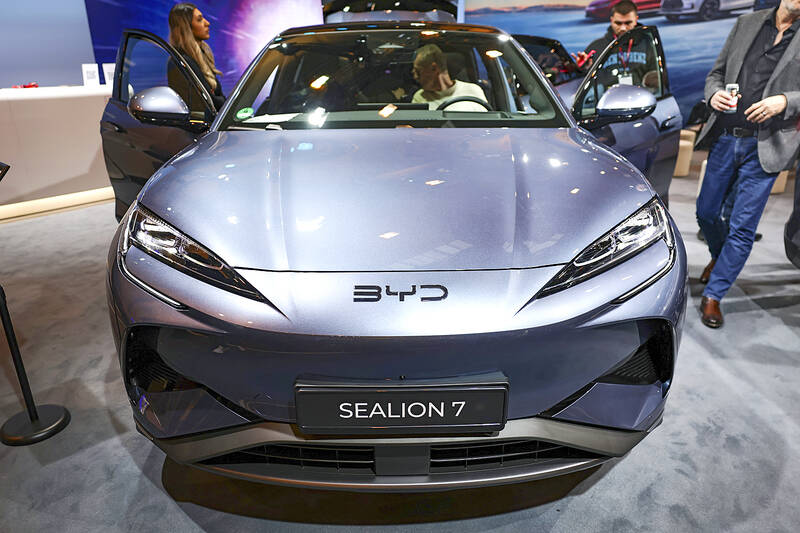China’s BYD Co (比亞迪) enjoyed a year-end surge to push total sales to 4.25 million passenger cars last year, narrowing its gap with Tesla Inc as the two vie for the crown of top-selling electric vehicle (EV) maker of the year.
The Shenzhen-based carmaker, which stopped making vehicles entirely powered by fossil fuels in 2022, hit a new monthly sales record last month, spurred on by subsidies and offering extra incentives to buyers.
BYD sold 509,440 plug-in hybrid and pure-electric passenger vehicles last month, the company said yesterday. The figure includes 207,734 EVs, taking the annual tally of battery-powered car sales to 1.76 million. Overall annual sales increased 41 percent year-on-year.

Photo: EPA-EFE
The rise of BYD as a best-selling car brand stands in contrast to the turmoil facing a growing number of legacy auto giants like Nissan Motor Co, Volkswagen AG and Stellantis NV. Western car brands have faced tumbling sales in China, while also lagging behind on the EV transition.
Tesla will unveil its fourth-quarter sales figures later this week. The Elon Musk-led company needs to deliver at least 515,000 EVs in the final three months of last year to meet its guidance for “slight growth” in annual sales, or 1.81 million deliveries, which would be a quarterly record for the company. Analyst estimates are for 510,400 deliveries, just shy of Tesla’s expectations.
By the third quarter, BYD had sold 1.16 million EVs, lagging Tesla by 124,100. However, the Chinese company has seen a last-quarter surge to narrow the gap with its US rival.
BYD’s surge will help cement its place among the top-selling carmakers globally. Its rise in total sales puts it near to beating Ford Motor Co and Honda Motor Co on an annual basis too. Higher sales will tip the company’s annual revenue over US$100 billion for the first time.
BYD’s gains have been fueled by domestic Chinese sales — and aided in the second half of the year by increased subsidies to convince drivers to ditch gasoline cars.
Its target to sell roughly half-a-million vehicles outside China has fallen short of expectations in the face of pushback from the European Union, which has imposed additional tariffs on Chinese EVs.
In Brazil, one of its biggest overseas markets, BYD is under scrutiny over allegations of slave-like conditions for some construction workers building a new EV factory.

CHIP RACE: Three years of overbroad export controls drove foreign competitors to pursue their own AI chips, and ‘cost US taxpayers billions of dollars,’ Nvidia said China has figured out the US strategy for allowing it to buy Nvidia Corp’s H200s and is rejecting the artificial intelligence (AI) chip in favor of domestically developed semiconductors, White House AI adviser David Sacks said, citing news reports. US President Donald Trump on Monday said that he would allow shipments of Nvidia’s H200 chips to China, part of an administration effort backed by Sacks to challenge Chinese tech champions such as Huawei Technologies Co (華為) by bringing US competition to their home market. On Friday, Sacks signaled that he was uncertain about whether that approach would work. “They’re rejecting our chips,” Sacks

It is challenging to build infrastructure in much of Europe. Constrained budgets and polarized politics tend to undermine long-term projects, forcing officials to react to emergencies rather than plan for the future. Not in Austria. Today, the country is to officially open its Koralmbahn tunnel, the 5.9 billion euro (US$6.9 billion) centerpiece of a groundbreaking new railway that will eventually run from Poland’s Baltic coast to the Adriatic Sea, transforming travel within Austria and positioning the Alpine nation at the forefront of logistics in Europe. “It is Austria’s biggest socio-economic experiment in over a century,” said Eric Kirschner, an economist at Graz-based Joanneum

BUBBLE? Only a handful of companies are seeing rapid revenue growth and higher valuations, and it is not enough to call the AI trend a transformation, an analyst said Artificial intelligence (AI) is entering a more challenging phase next year as companies move beyond experimentation and begin demanding clear financial returns from a technology that has delivered big gains to only a small group of early adopters, PricewaterhouseCoopers (PwC) Taiwan said yesterday. Most organizations have been able to justify AI investments through cost recovery or modest efficiency gains, but few have achieved meaningful revenue growth or long-term competitive advantage, the consultancy said in its 2026 AI Business Predictions report. This growing performance gap is forcing executives to reconsider how AI is deployed across their organizations, it said. “Many companies

France is developing domestic production of electric vehicle (EV) batteries with an eye on industrial independence, but Asian experts are proving key in launching operations. In the Verkor factory outside the northern city of Dunkirk, which was inaugurated on Thursday, foreign specialists, notably from South Korea and Malaysia, are training the local staff. Verkor is the third battery gigafactory to open in northern France in a region that has become known as “Battery Valley.” At the Automotive Energy Supply Corp (AESC) factory near the city of Douai, where production has been under way for several months, Chinese engineers and technicians supervise French recruits. “They